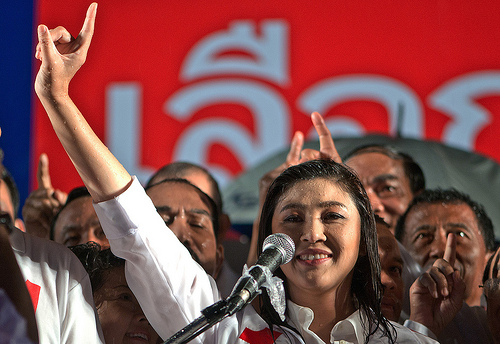Yingluck Shinawatra: Thaksin’s Shadow Puppet?

Please note that we are not authorised to provide any investment advice. The content on this page is for information purposes only.
14 July 2011.
Thailand is about to inaugurate its first female Prime Minister. Yingluck Shinawatra led her Pheu Thai party to victory in July’s general election winning 265 seats, and giving her party a majority vote in the 500 member parliament. Thailand’s current ruling government led by Abhisit’s Democrat Party will now take a backseat as the main opposition with only 159 seats in parliament.
14 July 2011.
Thailand is about to inaugurate its first female Prime Minister. Yingluck Shinawatra led her Pheu Thai party to victory in July’s general election winning 265 seats, and giving her party a majority vote in the 500 member parliament. Thailand’s current ruling government led by Abhisit’s Democrat Party will now take a backseat as the main opposition with only 159 seats in parliament.
Ms Yingluck prepares herself to lead Thailand out of its political standstill that began in 2006 when her brother, Thaksin was ousted in a military coup. But many wonder if she’s merely a surrogate Prime Minister, led by her brother behind the scenes.
Nevertheless, what she lacks in political experience, she makes up with her leadership and management capabilities.
Born in Chiang Mai, Yingluck attended Chiang Mai University and graduated with a Master’s Degree in public administration from Kentucky State University. She’s held top positions including CEO of Advanced Info Services (AIS); Thailand’s largest mobile operator, and Managing Director of SC Asset Co Ltd; a Shinawatra family-owned property development company.
Her current party, Pheu Thai Party was formed after the dissolution of the People’s Power Party in 2008. Yingluck was called to lead the party, but she declined, wanting to focus on her family business. As speculation about a possible election in early 2011 deepened, calls continued for Yingluck to lead the party to victory in the election.
Finally in May 2011, with endorsement from veteran politician and MP Charlem Ubumrung, Pheu Thai party voted Yingluck the party’s top candidate and its nominee for premier. [quote]Her brother, Thaksin, who lives in self-exile in Dubai, proudly declared his sister as ‘his clone’ in an exclusive interview. [/quote]
Indeed, Yingluck’s main message during the election was the reconciliation of the nation.
She also proposed certain measures opposed by the Democrats; general amnesty for all major politically-motivated incidents since the 2006 military coup – including overturning a court ruling that bans former Thai Rak Thai and People’s Power Party leaders from seeking office. Alas, a conviction that accused her brother, Thaksin, for the abuse of power.
Her proposal is seen by Democrat leaders and Thailand’s present Prime Minister Abhisit as a plot to bring Thakin back to the country and reprieve him of the political crimes he committed since the coup. However, Yingluck says that her move aims to reconcile all Thais.
She has proposed to eliminate poverty by 2020 by;
- Reducing corporate income tax from 30% to 23%, and then to 20% by 2013.
- Minimum wage will be raised to 300 baht per day, and 15,000 per month for university graduates.
- She plans to provide loans of up to 70% of expected income for farmers, based on a guaranteed rice price of 15,000 baht/ton.
- She also plans to provide free public Wi-Fi and a tablet PC to every school child, a plan that was abandoned during the 2006 coup.
Yingluck is widely considered by many as Thaksin’s proxy and expected rule the nation with her brother’s motivations. But do her proposed policies resemble to her brother’s during his 2001 – 2006 administration?
When Thaksin came to power in 2001, he implemented a set of economic policies, also known as ‘Thaksinomics’; a set of populist economic policies aimed at improving the lives of the country’s rural people.
His plans were to make Thailand a “domestic consumption-based” economy less reliant on exports. Populist measures were also implemented, such as subsidized housing, low-cost healthcare, debt moratorium for farmers, and most famously, disbursing one million baht to every village in the country.
Related: Thailand Exports, Imports and Trade
During Thaksin’s reign from 2001 to 2006, Thailand’s GDP (PPP) increased between 7.1 to 9.2 percent annually, and GDP (PPP) increased from US$5,192 in 2001 to US$7,689 in 2006. The Thai economy also recovered from the 1997 Asian Financial Crisis, repaying all its debts to the IMF incurred during the crisis – and became less dependent on its exports.
Thaksinomics propelled Thailand’s economy until 2005 when it took a huge setback and the economy experienced slow growth. While critics argued the ineffectiveness of Thaksinomics, supporters cited the Great Indian Ocean Tsunami in 2004 and rising global oil prices as reasons for slow growth.
It’s evident that Yingluck’s future plans for Thailand are similar to that of her brother’s; aiming to elevate income levels and standard of living of the Thais through implementation of populist policies.
However, unlike her brother, the effectiveness of her policies to boost economic growth and reconcile the politically-divided nation still remain a mystery.
To Yingluck’s opponents, she will remain labelled as Thaksin’s puppet, but time will tell if she’s serious about reconciling the nation. Her political path as Thailand’s first female prime minister may not be rosy, and she will find many ready to scrutinize her for every move she makes – regardless if it’s hers or her brother’s.
Ng Ding Neng, EconomyWatch.com




